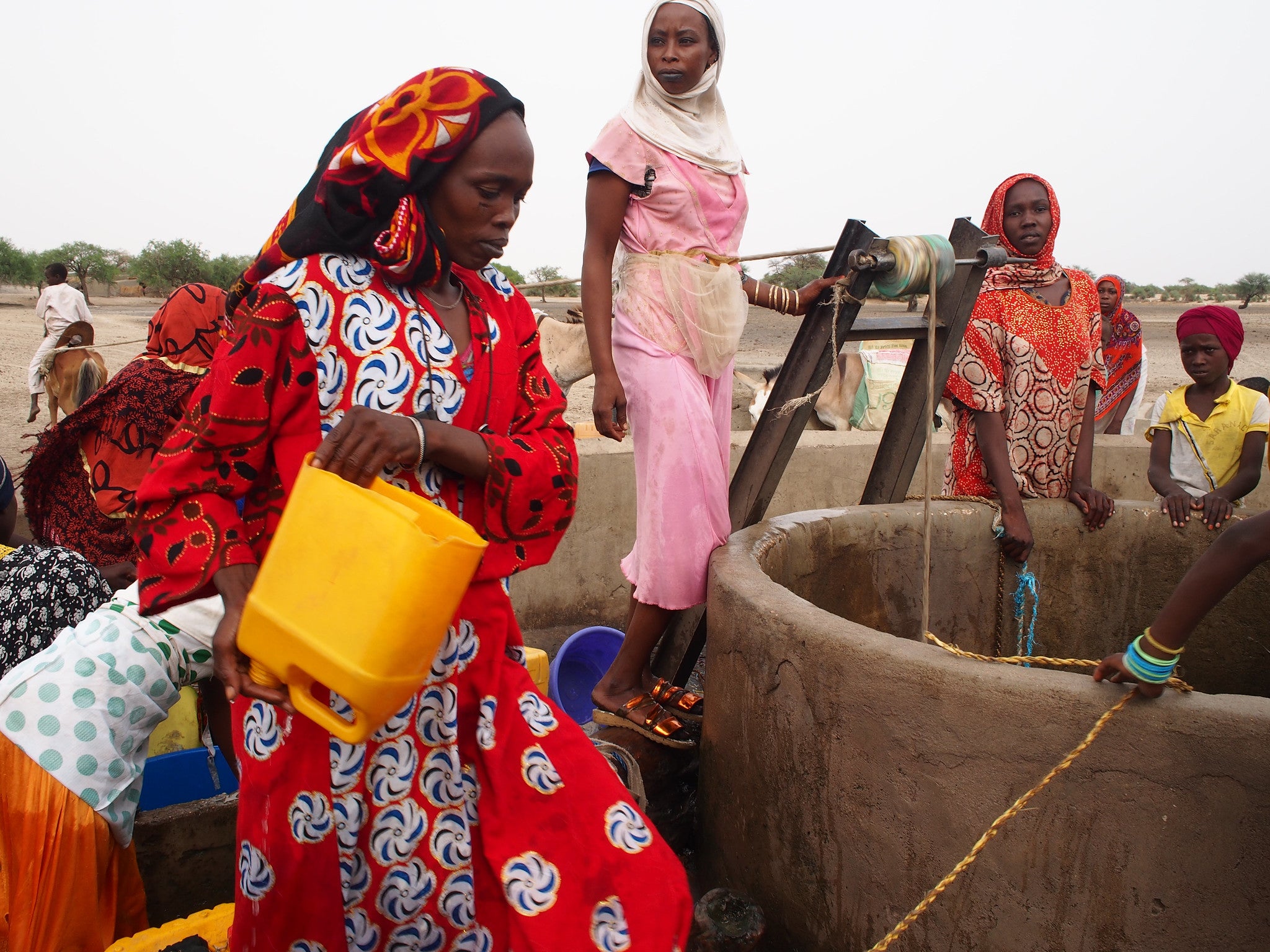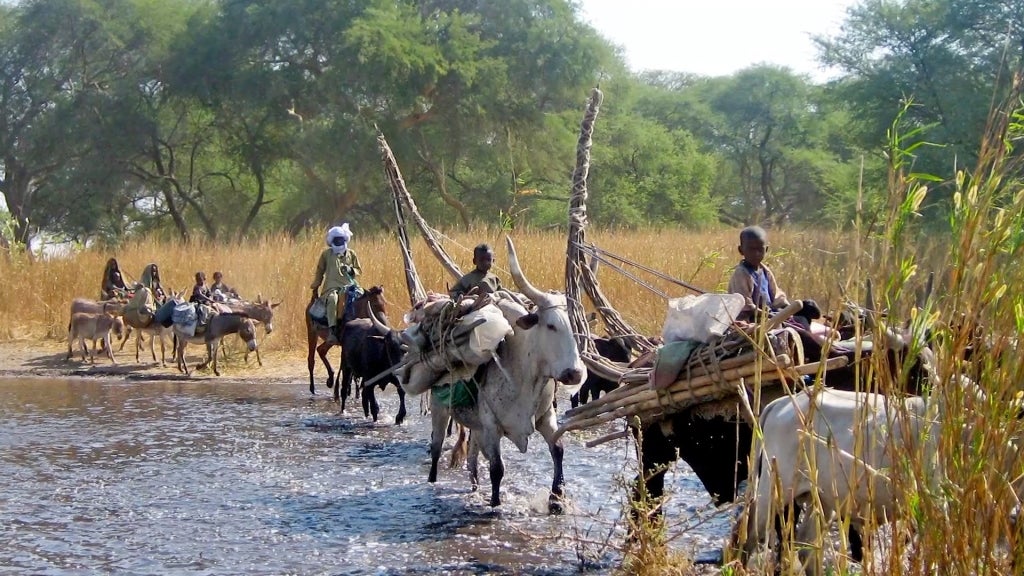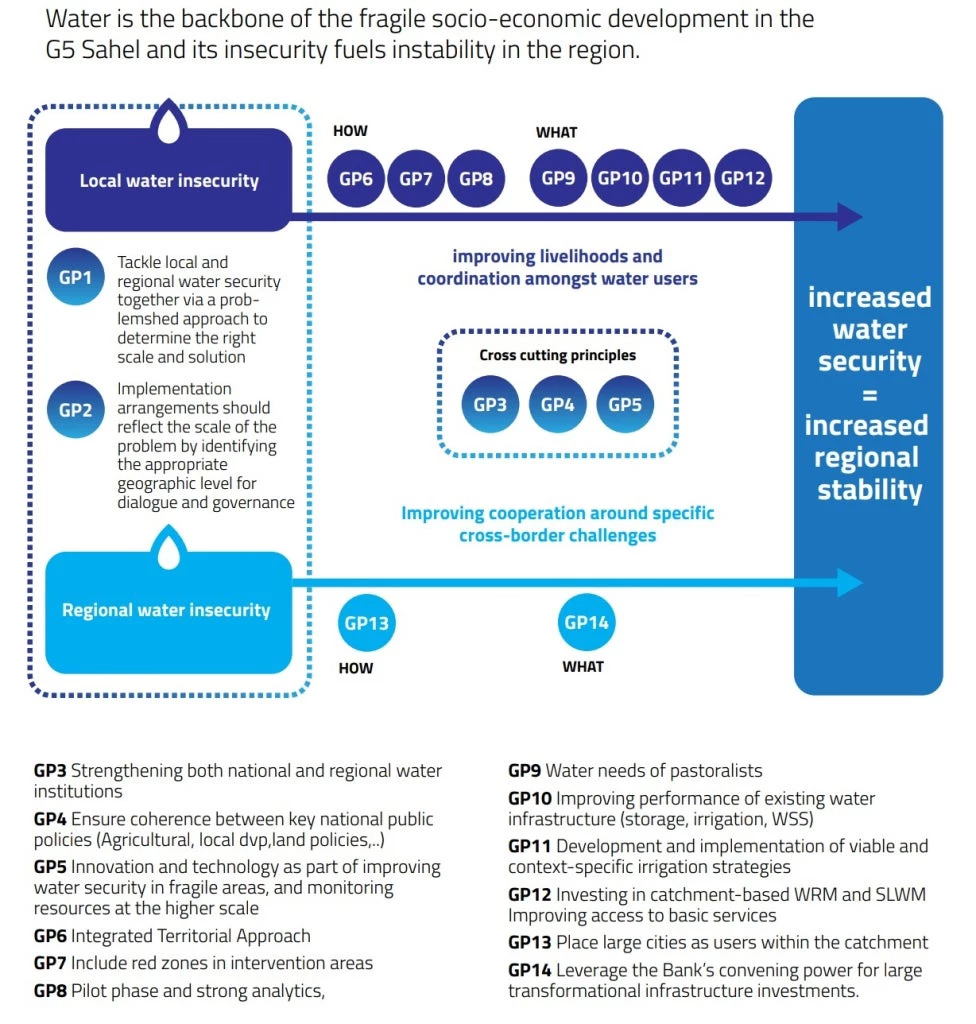 Women at a water well in Chad. Photo credit: Pierre Laborde/Shutterstock
Women at a water well in Chad. Photo credit: Pierre Laborde/Shutterstock
The World Bank’s engagement in transboundary waters in West Africa is at a turning point, at a time when the G5 Sahel countries of Burkina Faso, Chad, Mali, Mauritania, and Niger are facing unprecedented challenges. It is time to shift its focus from an integrated water resources management (IWRM) approach to a more comprehensive regional water security framework, as outlined in a new World Bank report, Strengthening Regional Water Security for Greater Resilience in the G5 Sahel.
In the Sahel, where most bodies of water cross national borders, water is both a fundamental constraint and an integrator for development. In the Sahel, most livelihoods and economies are highly dependent on the precious resource; if well managed, shared waters can drive peace, prosperity, and security. But in the rural areas of the Sahel, water insecurity intersects with energy insecurity, food insecurity, ecological crises, conflict, and migration, often driving a downward spiral of degradation of resources and increasing poverty.
These local challenges are compounded regionally by the development of large transboundary infrastructure such as dams, unregulated water abstractions by large water users such as capital cities and mega- irrigation schemes, and pollution from mining and poor urban sanitation. If not properly managed, these factors can lead to an unequal sharing of benefits, negative environmental impacts, tension, and conflict. These challenges must be urgently addressed to achieve development priorities in the region.
Over the past 20 years, World Bank regional water projects in West Africa have focused on transboundary water cooperation and management , informed largely by an IWRM approach and working through river basin organizations (RBOs) as natural counterparts. A recently completed Working Paper of this engagement shows mixed results. While several tangible and intangible results have been achieved, particularly in the Senegal and Niger river basins, it has become clear that given today’s challenges, a more comprehensive intervention paradigm is needed. Moreover, the link between water security and overall security and stability is now widely recognized, and yet has remained largely absent from the World Bank’s historical regional engagement in transboundary water management.

Though steering high-level regional water cooperation remains critical in the region, if local water security challenges are not adequately addressed, they may compound and intensify wider socio-economic problems and fragility with cross-border and even regional effects. For example, because of lack of grass for animal feeding and water shortages, pastoralists migrate toward agricultural areas, often located along permanent water courses, creating tensions with farmers. In turn, improving local water security at strategic locations, including fragility hotspots, can help address cross-border and regional challenges in the Sahel through three main pathways: i) reducing environmental migration and decreasing pressure on host communities; ii) reducing conflict between farmers and pastoralists, and iii) (re)establishing citizens’ trust in the state and contributing to overall security.
Thus, the question is how can the World Bank effectively improve water security to both boost socio-economic development and reduce fragility and conflict in the G5 Sahel countries? The current Sahel context and lessons learned from the World Bank’s past engagement in the region call for an integrated problemshed approach (IPA) to water security that might prove more effective than a linear, normative application of IWRM principles centered around an RBO. A problemshed is a spatial unit where issues and actors unite and where collective action can be taken due to proximity and tangible interests shared among neighboring regions or countries. By focusing on actionable interventions and impact around common objectives, addressing issues as a problemshed has a higher chance of improving water insecurity than traditional methods.
Adopting a problemshed perspective also allows for more flexibility in selecting partnerships and implementation arrangements based on the political economy and capacity to deliver. Importantly, a problemshed approach does not preclude an important role for RBOs, but instead helps determine the most effective role for these agencies and focus on areas where change is realistic. For instance, RBOs like the Senegal River Basin Organisation (in French, the Organisation Pour la Mise en Valeur du Fleuve Sénégal (OMVS)) and the Niger River’s Niger Basin Authority (NBA) remain strategic counterparts for decisions at the regional level, including knowledge brokerage for coordinated and informed development and operation of large dams. Similarly, a problemshed does not replace a watershed - rather, it allows local, regional, national, and development actors to focus on the watershed at the appropriate scale.
Why integrated? The current challenges faced by the region have outgrown the traditional sector-based approaches to water security, which necessitates a course correction. The integrated problemshed framework expands the traditional scope of transboundary water interventions in the Sahel to (i) encompass the whole spectrum of water resources, including deep and shallow groundwater, and permanent and seasonal rivers, rainfall, and runoff instead of focusing solely on the main transboundary rivers; (ii) better integrate multiple water uses in a single spatially defined intervention, and (iii) address broader questions of fragility and conflict. Water interventions also need to be complemented by a wide range of ancillary services that should work synergistically toward the same e objective – be it a socio-economic and /or stability goal. Adopting an IPA, whose territorial boundaries encompass the problem and cross-border challenges to be addressed, enables coordination of local water solutions with other sectors’ operations, such as roads, transportation, markets, electricity, education, and health, to maximize cross-border and regional impact.
Our report proposes 14 Guiding Principles (GPs) to steer implementation of an integrated problemshed approach in future engagements on regional water security in the Sahel. To reflect the different scales of water security challenges and thus diversify World Bank engagement in transboundary cooperation, the GPs are divided into three categories: i) overarching principles about working across scales and choosing implementation arrangements, as well as other principles related to data management and institution strengthening; (ii) the design of local interventions that realize the full span of benefits, including at cross-border and regional levels; and (iii) improvements in regional coordination for water security (for example , planning and managing large infrastructure on shared water resources).
To conclude, an integrated problemshed approach is needed for development actors to promote water security in the Sahel. Framing water security in terms of both local and regional challenges broadens the scope of transboundary cooperation and keeps it moving on these two tracks according to the appropriate scale for specific problems. It may not be easy to fully implement all these principles in the World Bank’s next project(s) – like all innovations, it may take some time. But if we succeed, water security in the G5 Sahel will be a step closer to reality.






Join the Conversation